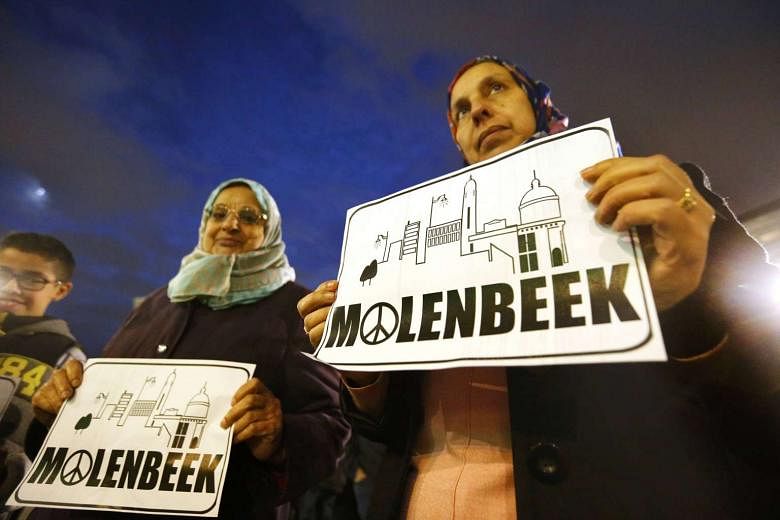BRUSSELS (AFP) - Belgium's security services are on the defensive after the Paris attacks, accused of blunders, infighting and worrying leniency towards radicalism that let the perpetrators slip under the radar.
As the smoke cleared from Friday's bloodshed, there was soon a sense of deja vu as it emerged the plot was the latest in a series tied to Belgium and the impoverished Molenbeek district of Brussels in particular.
French President Francois Hollande said that the attacks were "planned in Syria, prepared and organised in Belgium."
Molenbeek is only a short drive from the EU and Nato headquarters, but for years it has been Europe's top militant haven, a situation worsened by Belgian bureaucracy that makes effective policing almost impossible, analysts said.
"In this team of jihadists, many were well known in Brussels. Someone clearly screwed up," said Alain Chouet, a former security chief at France's DGSE external intelligence service.
Top Belgian officials have however pushed back at the critics, reminding that Brussels was the first to suffer in the latest wave of attacks by ISIS-backed militants.
"We were the first to suffer this sort of shock last year, at the Jewish museum with four victims and a attacker from France," Belgium's foreign minister Didier Reynders told AFP.
"Since the start of the year, we have sentenced 160 people for radicalism in Belgium," he said.
The most notorious militant connected to Brussels is Abdelhamid Abaaoud, the alleged mastermind of the Paris attacks, who grew up in Molenbeek before going to join the Islamic State in Syria.
He escaped a raid on a terror cell in Belgium in January which killed two other militants but French officials said he was targeted in an operation in Paris on Wednesday.
Meanwhile, Molenbeek native Brahim Abdesalam, who blew himself up in front of a cafe in Paris on Friday, and his brother Salah, who is wanted by French authorities over the attacks, were well known to Belgian authorities for radicalism and for running a bar in Molenbeek used by drug dealers to sell and smoke pot.
This year, the two were questioned by police on their radical activities, but released without charge and without a report to French authorities.
"We knew that they were radicalised and could make their way to Syria," said Eric Van Der Sypt, the spokesman for Belgium's federal prosecutor. "But they showed no sign of a possible danger."
French authorities are reportedly furious that Salah was not flagged up on any database, as he was pulled over by French police the morning after the attacks but then waved on without suspicion.
Belgium is arguably Western Europe's most divided nation, separated into three regions: the Dutch-speaking Flanders, francophone Wallonia and Brussels, the EU capital whose population of 1.2 million people is about two-thirds of foreign origin.
Since the attacks, Belgian media have come down hard on its capital city's security shortfall.
"This terror cell was able to buy explosives, weapons and rent getaway cars without the slightest hindrance. This is an intolerable intelligence gap and a blunder," a police source told De Morgen newspaper.
Uniquely for a major city, policing in Brussels is divided into six brigades that are divided by neighbourhood and highly autonomous.
A federal force exists on top of that to fight terrorism and serious crime.
Meanwhile it also has 19 mayors for its different districts.
"It is complicated to coordinate action when you are several around the table," said Christian de Valkeneer, a prosecutor from Liege, another city in Belgium.
Also criticised is a blatant lack of Arabic speakers in Belgium's security services nationwide, an aberration given the size of Belgium's immigrant population of Arabic and especially Moroccan origin.
This is an "enormous problem", said Hans Bonte, the MP and mayor of Vilvoorde, a Brussels suburb from where many Belgians of Moroccan origin have left to join Islamic State jihad in Syria.
Under fire, too, is the ex-longtime mayor of Molenbeek, Philippe Moureaux.
A former interior and justice minister, he is accused of turning a blind eye to radicalism in order to shore up power in his district and run it like a fiefdom for over two decades.

